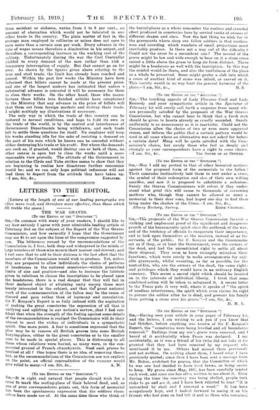CORRESPONDENCE.
LABOUR DEMANDS IN THE COAL TRADE. [To sus Roma or viz "Sescrsvos."1
Sts.,—Men engaged in almost every employment are putting forward demands for an increase in their rate of wage and a decrease in their hours of work. Amongst others, there is a demand on the part of the men employed in the collieries of this country for an increase of 30 per cent. in their standard rate of wage, and an alteration in the law limiting their hours of employment in collieries or mines from eight hours to six hours per day. They threaten that if their demands aro not conceded they will strike, and by so doing paralyse the industrial reconstruction of the country. A large proportion, the majority of your readers I imagine, hardly realize what the effect would be both on themselves and on the industries of the country were these demands conceded. The following figures may, therefore, be of interest. In the first place, ii would mean an advance of at least 5s. per ton in the cost of all coal at the pit-month. At the present time there are few collieries in the country that are working at a profit; and the Coal Controller, who is responsible, could not afford a further deficit of 5s. per ton on the total output of the country. He would, therefore, be compelled to raise the price by 5s. per ton at least, to every consumes, But let me carry the figures still further. The men engaged in the coke-ovens would naturally demand a similar advance of wages and reduc- tion in their hours, and this combined with the increased cost of the coal used would necessitate an increase in the price of coke of at least 10s. per ton. That again would affect the oust of pig-iron. In the case of hematite-iron an advance of 1213. 13d. a ton would be necessary; while in Cleveland iron the increased cost would amount to .61, as the ironstone miners would certainly demand the some advance as those given to the workers in the collieries. This again would increase the cost of manufactured steel by at least 39.9. a ton. At the present time the cost of heavy steel—rails, joints, girders, Ac.—in this country is at least 80s. a ton above the price at which the American manufacturers are offering to deliver them, free on board; and if another 30s. is to be added to that cost, how is it possible that the British works are to be kept employed? It is useless to talk about diminishing the hours of employment, so as to find work for the men when they are demobilized, if the cost thereby is to be run up to u point which renders it impossible for any works to be keen going in the future.
But let me return to the question of the collieries. Since June, 1914, the rate of wages has been greatly increased, and what has been the effect of it? The output per man has very considerably diminished. I have before me the figures of a large group of collieries in the North of England. In June, 1914, the output per man was 2.93 tons per shift, whereas note It is only 2.43 tons per shift; or. if you take the total hands employed, while the output in 1914 was 1.96 tons per man per shift, it has now fallen to .78. or a falling off of 25 per cent. IS the output per man employed. In the same collieries, the loss of time through the men's own neglect, apart altogether from accident or sickness, varies from 5 to 8 per cent., en amount of abstention which would not be tolerated in any other trade in the country. The plain matter of fact is, the average man employed in collieries or mines does not care to earn more than a certain sum per week. Every advance in the rate of wages means therefore a diminution in his output, and therefore a corresponding increase in the working cost of the colliery. Unfortunately during the war the Coal Controller yielded to every demand of the men rather than eels a temporary interruption of supply. Bat that cannot go on for ever. As shown by the figures given above relating to the iron and steel trade. the limit has already been reached and passed. Within the peat few weeks the Ministry have been informed that billets cannot be made at the present price. and one of the largest makers has intimated that unless a substantial advance is conceded it will be necessary for them to close their works. On the other hand, those who manu- facture these billets into finished articles have complained to the Ministry that any advance in the price of billets will shut them out from foreign markets and destroy their trade. I might multiply my illustrations if necessary.
The only way in which the trade of this country can be restored to normal conditions, and hope to hold its own in the trade of the world, is by the control and interference of Government Departments being withdrawn, and each trade left to settle these questions for itself. No employer will keep his works standing idle for the sake of resisting a demand on the part of his men which he knows can be conceded without either destroying his trade or his profit. But where the demands are such as, if granted, would destroy one or both of them, no other course is open but to close the works until a more reasonable view prevails. The attitude of the Government in relation to the Clyde and Tube strikes seems to show that they are beginning to realise how disastrous further concession would be; and we can only hope political influences will not lead them to depart from the attitude they have taken up.



































 Previous page
Previous page